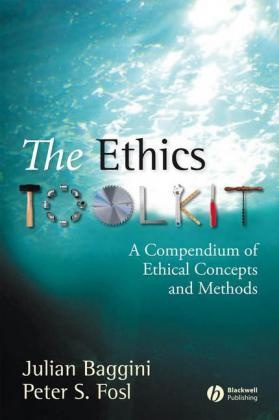Read more
Informationen zum Autor Julian Baggini is editor and co-publisher of The Philosophers' Magazine. He is the author or co-author of over a dozen books on philosophy. His journalism also appears in newspapers and magazines such as the Guardian, Times Higher Education Supplement, and Times Educational Supplement. His PhD was awarded by University College London in 1996. Peter S. Fosl is Professor of Philosophy at Transylvania University in Lexington, KY, and recipient of the 2006 Acorn Award for Kentucky's outstanding university teacher of the year. Educated at Bucknell University, Emory University, the London School of Economics, and the University of Edinburgh, Fosl is a contributing editor to The Philosophers' Magazine and co-editor of the Dictionary of Literary Biography volumes on British philosophers. He has published on Hume, skepticism, the philosophy of religion, and topics in the history of philosophy. Klappentext The Ethics Toolkit provides an accessible and engaging compendium of concepts, theories, and strategies that encourage students and advanced readers to think critically about ethics so that they can engage intelligently in ethical study, thought, and debate.* Written by the authors of the popular The Philosophers' Toolkit (Blackwell, 2001); Baggini is also a renowned print and broadcast journalist, and a prolific author of popular philosophy books* Uses clear and accessible language appropriate for use both inside and beyond the classroom* Enlivened through the use of real-world and hypothetical examples* Cross-referencing of entries helps to connect and contrast ideas* Features lists of prominent ethics organizations and useful websites* Encourages readers to think critically about ethics and teaches them how to engage intelligently in ethical study, thought, and debate Zusammenfassung The Ethics Toolkit provides an accessible and engaging compendium of concepts, theories, and strategies that encourage students and advanced readers to think critically about ethics so that they can engage intelligently in ethical study, thought, and debate.* Written by the authors of the popular The Philosophers' Toolkit (Blackwell, 2001); Baggini is also a renowned print and broadcast journalist, and a prolific author of popular philosophy books* Uses clear and accessible language appropriate for use both inside and beyond the classroom* Enlivened through the use of real-world and hypothetical examples* Cross-referencing of entries helps to connect and contrast ideas* Features lists of prominent ethics organizations and useful websites* Encourages readers to think critically about ethics and teaches them how to engage intelligently in ethical study, thought, and debate Inhaltsverzeichnis Acknowledgements.INTRODUCTION.I The Grounds of Ethics.1.1 Aesthetics.1.2 Agency.1.3 Authority.1.4 Autonomy.1.5 Care.1.6 Character.1.7 Conscience.1.8 Evolution.1.9 Finitude.1.10 Flourishing.1.11 Harmony.1.12 Interest.1.13 Intuition.1.14 Merit.1.15 Natural Law.1.16 Need.1.17 Pain and pleasure.1.18 Revelation.1.19 Rights.1.20 Sympathy.1.21 Tradition and history.II Frameworks for Ethics.2.1 Consequentialism.2.2 Contractarianism.2.3 Cultural critique.2.4 Deontological ethics.2.5 Discourse Ethics.2.6 Divine command.2.7 Egoism.2.8 Hedonism.2.9 Naturalism.2.10 Particularism.2.11 Perfectionism.2.12 Pragmatism.2.13 Rationalism.2.14 Relativism.2.15 Subjectivism.2.16 Virtue ethics.III Central Concepts in Ethics.3.1 Absolute/Relative.3.2 Act/Rule.3.3 Bad/evil.3.4 Beneficence/non-maleficence.3.5 Cause/reason.3.6 Cognitivism/non-cognitivism.3.7 Commission/omission.3.8 Consent.3.9 Facts/values.3.10 The Golden Mean.3.11 Honour/shame.3.12 Individual/collective.3.13 Injury.3.14 Intentions/consequences.3.15 Internalism/externalism.3.16 Intrinsic/instrumental Value.3.17 Legal/moral.3.18 Lib...

